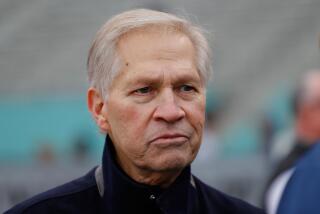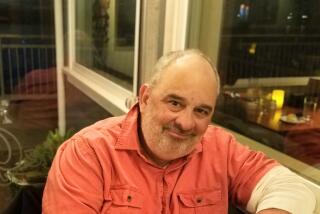Chris Economaki dies at 91; pioneering motor sports journalist
Chris Economaki, a journalist long regarded as the authoritative voice in motor sports, died Friday. He was 91.
National Speed Sport News, which Economaki edited and published for more than 60 years, announced his death but gave no details.
Economaki, who was often called the “dean of American motor sports journalism,” worked in television for more than 30 years with stints at ABC, CBS and ESPN.
He was part of ABC’s first telecast from Daytona International Speedway in 1961, then became a pit reporter and commentator for the network’s “Wide World of Sports” until 1983.
After moving to CBS in 1984, he called races for that network until 1993. He also covered Formula One races for ESPN in the late 1980s.
Born Oct. 15, 1920, in Brooklyn, N.Y., to a Greek immigrant and his wife, Economaki grew up in Ridgewood, N.J., and attended his first race in Atlantic City when he was 9.
“My interest in racing stemmed from the noise at the Ho-Ho-Kus Speedway,” he told the North Jersey Herald News in 2006. “You go out in your frontyard and you hear the ‘rrrrrmmmm’ coming from the horizon.”
After watching races at local venues, he began peddling the motor sports newspaper at the tracks, then worked as a reporter while a teenager.
Economaki served in the Army during World War II, then returned to his job at what was then a weekly publication. In 1947 he gave track announcing a try and found he was good at it. His appearances at tracks along the East Coast boosted circulation at National Speed Sport News, where he became editor and publisher in 1950.
On NASCAR founder Bill France’s recommendation, ABC Sports chief Roone Arledge hired Economaki for a new program called “Wide World of Sports.” On television Economaki conducted trackside interviews with drivers and provided analysis of all types of events — open-wheel racing, stock-car racing, drag racing, midgets and sprint cars.
For his newspaper, he wrote a weekly column that was considered required reading in the motor racing community.
Four-time Indianapolis 500 winner A.J. Foyt remembered when Economaki pegged him early in his career as one of racing’s next big stars.
“He saw the sport grow to where it is today and how it grew, including NASCAR,” Foyt said. “And he contributed to that growth. I’d say when he was in his heyday of writing that more people would read his column than any column that’s been written today by far. I know I did.”
In 2006, the Trackside Conference Room at the Indianapolis Motor Speedway Media Center was renamed the Economaki Press Conference Room.
Economaki acknowledged that he had a distinctive voice, telling the Associated Press in 1991: “I was getting a pair of shoes in Des Moines, Iowa, one time. The salesman was lacing up my shoes, and ... he asks: ‘Aren’t you on TV?’ This guy’s got his nose six inches from the floor and asks my shoes if I’m on TV. He doesn’t recognize me, but he recognizes my voice.”
Economaki left the TV broadcast booth in the mid-1990s but continued writing his column for National Speed Sport News, which is now published online only.
In 2003, he told Times motor sports columnist Shav Glick: “I’m going to keep doing what I’m doing until the checkered flag waves.”
Economaki’s survivors include his daughters Corinne and Tina and two grandchildren.
More to Read
Start your day right
Sign up for Essential California for the L.A. Times biggest news, features and recommendations in your inbox six days a week.
You may occasionally receive promotional content from the Los Angeles Times.



















































